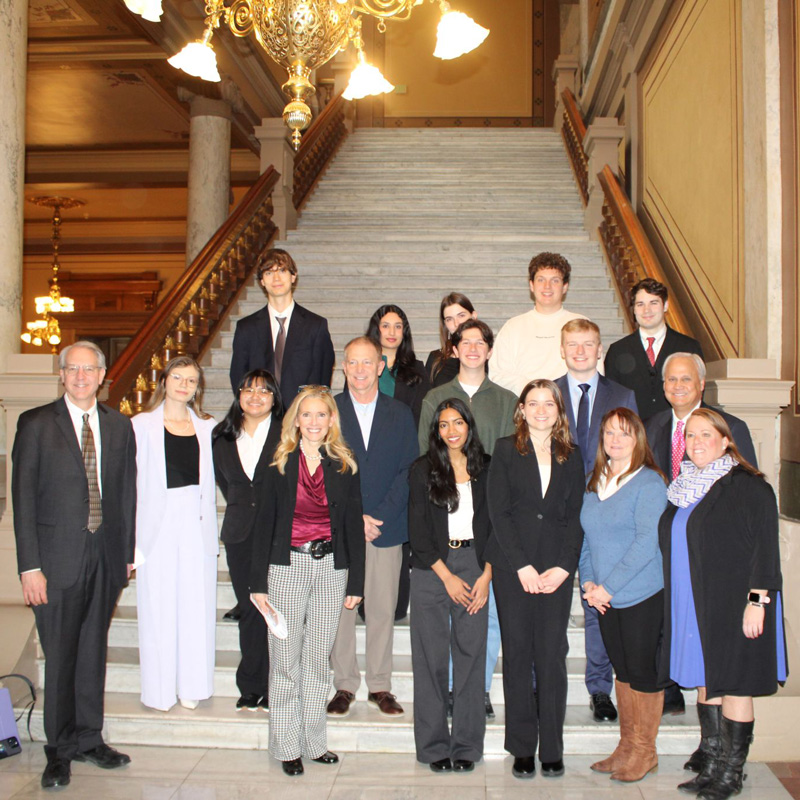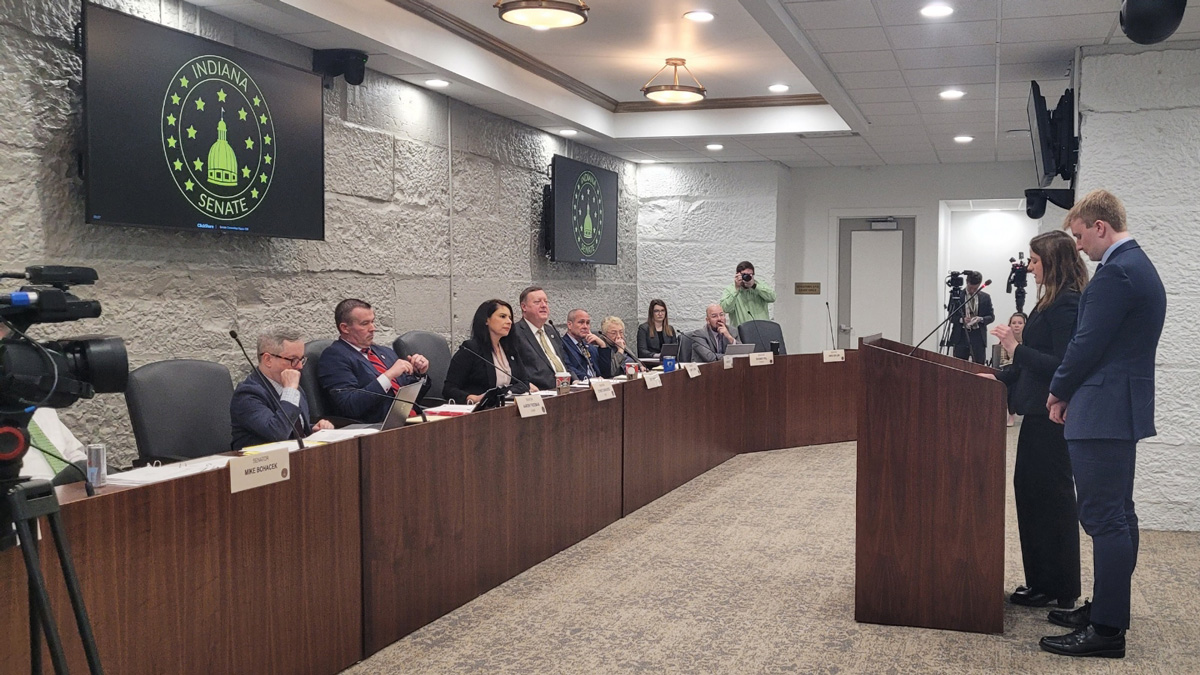Persistence Pays off in Passing of Indiana Lifeline Law

A bill expanding Indiana’s Lifeline Law has been signed into law by Indiana Gov. Mike Braun thanks to the persistence and work of Purdue Student Government, led by president Jason Packard and vice president Rebecca Siener.
Senate Bill 74 grants immunity to underage drinkers suffering from alcohol-induced health emergencies who have called for medical assistance or had medical assistance called for them from criminal prosecution for certain crimes. The previously existing law only provided amnesty from arrest or prosecution to the caller and those who assist the caller, stay on the scene and remain compliant. The crucial expansion via Senate Bill 74 now provides protection to the person in need of medical attention.
The process to amend the Indiana Lifeline Law dates back to September 2023, when Siener and Packard were members of the Residence Hall Association (RHA). Through their work in RHA representing students living in University Residences, Siener and Packard discovered that students were more fearful of legal repercussions than potentially life-threatening alcohol poisoning when faced with situations that could require calling emergency services.
“I went on a research spiral and realized that it was actually students who changed the Indiana Lifeline Law back in 2012,” Siener says. “The law itself would not be in effect today without the work of Purdue Student Government in 2012. I brought that to Jason [Packard] and we realized we actually have the ability to change state law. They did it in 2012 and we can do it again.”
Siener and Packard were inspired to action. They began connecting with organizations on campus, in the Greater Lafayette community and on campuses across the state of Indiana even as they were in the midst of their run for Purdue Student Government. Once they were elected, Siener and Packard had a platform to advocate for students at Purdue and beyond.

To begin gathering information and building connections, Siener and Packard started locally with organizations and individuals on campus and in the Greater Lafayette area. They then extended their reach beyond campus and found support in the form of student governments at Marian University, Valparaiso University, DePauw University, Butler University and Indiana State University. These student governments formed the backbone of the Indiana Lifeline Law Coalition.
“We got all these student representatives together from these different colleges to talk about the Lifeline Law,” Siener says. “They talked about the situations they saw on their campuses and we saw that we all had these shared experiences. From that, we had a unifying front. I’ve never seen students that engaged with legislative change. We had so many students who were contributing and locked in. Every student knows the impact of this law and has these experiences, so it’s very personal to them.”
When it came time to lobby legislative support for an expansion to the Indiana Lifeline Law, Siener and Packard connected with former Senator Jim Merritt, who sponsored the original bill in 2012. With his support and network of connections, Siener and Packard were able to build support within the Indiana Senate. They connected with several senators and ultimately worked with Sen. Ron Alting, a Lafayette Republican, who authored the bill.

Siener and Packard routinely traveled back and forth to the Indiana Statehouse to lobby members of the General Assembly, assist in the writing of the bill, testify in front of committees and talk to media to draw attention to the bill.
“We knew that we needed to create a lot of attention around this initiative because by creating a lot of talk, the bill was more likely to be passed,” Siener says. “We wanted people to pay attention to it. A lot of that was traveling down and meeting with people. We had a presentation we would go through and our goal was that whoever saw it would leave incredibly informed so that if the bill hit their committee or the floor, they were ready to debate with the other legislators. We didn’t just want support – we wanted them to be able to defend us.”
Even after all the work to build a coalition, there was no guarantee of success, with three previous efforts to amend the Indiana Lifeline Law having failed since its initial passing. Fortunately, the persistence of Siener, Packard and the Indiana Lifeline Law Coalition paid off and Senate Bill 74 enjoyed widespread bipartisan support.
The bill passed by a 43-6-1 margin (for-against-absent) in the Senate, while the House voted 87-3 to send the bill to Gov. Braun’s desk for signature. Siener, Packard and members of the student governments that make up the Indiana Lifeline Law Coalition will attend a ceremonial signing in the Governor’s office on April 23. The law will go into effect July 1, 2025.
“It’s been an incredible experience to see two years of effort come to fruition like this,” Siener says. “This has been an all-consuming initiative. It took up my time every day and it was hard to balance all of this with school. We got so involved and dove so deeply into this initiative that it’s become very personal and changed my entire career trajectory – I’m now planning to go to law school.”
The passing of the law is a testament the persistence and initiative of Siener, Packard and the coalition they have built through Purdue Student Government and the Indiana Lifeline Law Coalition.

“It was hard to stay resilient at time because of the knowledge that this has failed before,” Siener says. “In September of 2023, we realized that the Lifeline Law needed to expand, we found a way to alter it and we carried it all the way. It wasn’t just about going to speak and having our opinions heard – we wanted to see this through and we carried it all the way.”
Siener, who was recently elected president of Purdue Student Government for the 2025-26 academic year, hopes to see the coalition of student governments stay active – whether it’s around this issue or other political endeavors that affect students.
“I hope that this can be sustained in the future, too” Siener says. “Students should be involved in legislative change. If there’s an issue that impacts our demographic, we should be the ones to speak out about it.”
About Purdue Student Government
Serving as the primary representative organization of the undergraduate student body, Purdue Student Government acts as a liaison between the Purdue University administration, governmental authorities and the student body to serve the needs of Purdue students and enhance the student experience at Purdue University. Learn more about Purdue Student Government and follow the organization on Instagram for news, events and other information.
 .
.